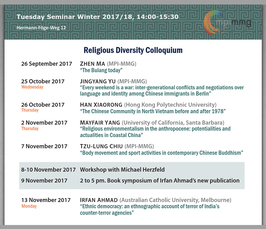"Body movement and sport activities in contemporary Chinese Buddhism"
Religious Diversity Colloquium Winter 2017/18
- Datum: 07.11.2017
- Uhrzeit: 14:00 - 15:30
- Vortragende(r): Tzu-Lung Chiu (MPI-MMG)
- Tzu-Lung Chiu is a postdoctoral fellow at the Max Planck Institute for the Study of Religious and Ethnic Diversity. In 2016 she received a Ph.D.at Ghent University, Belgium. In her dissertation, Contemporary Buddhist Nunneries in Taiwan and Mainland China: A Study of Vinaya Practices, she explored Chinese Mahāyāna nuns’ perceptions of how they interpret and practice vinaya rules in the contemporary contexts of Taiwan and Mainland China.
- Ort: MPI-MMG, Hermann-Föge-Weg 12, Göttingen
- Raum: Conference Room

For more details please contact vdvoffice(at)mmg.mpg.de.
Physical activities are part of daily life, and this did not go unnoticed by the early Buddhist disciplinary masters in India. To protect the good reputation of the monastic community, their normative texts (vinaya) encouraged monastics to control their body movements, and to strictly remain decent. Nevertheless, far from condemning all exercise, the masters warmly commended walking as strengthening the body and the mind. This utilitarian aspect was key to walking’s acceptance, for as soon as any physical activity became linked to ‘useless’ leisure, it was no longer allowed. The strongest condemnations were of monastics who indulged in all kinds of bodily games for the entertainment of the public, in part because this was morally wrong in itself, and in part because it was seen as ridiculing the monastic community and thus discouraging donations.
This lecture investigates what the framework of social control and morality surrounding sport and bodily movement implied and continues to imply for Buddhist monastics in China, particularly nuns. How were Indian normative texts on these topics interpreted, and what aspects of them have received become emphasized or de-emphasized in the modern context of Chinese Buddhism? And how are Chinese normative guidelines of the past implemented today?